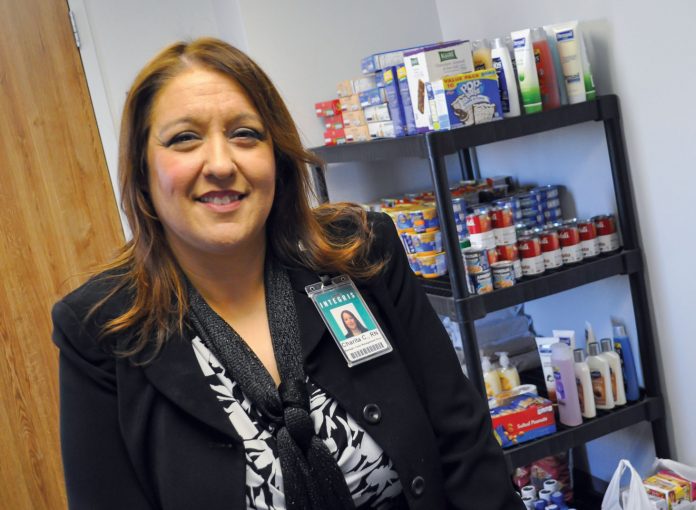
by Bobby Anderson, Staff Writer
To say Charita Chavez, MSN, RN, CCM wears many hats on a daily basis is an understatement.
For Chavez, the manager of case management services at Integris Southwest Medical Center, and her staff, wearing more than one hat isn’t just in their job description it’s vital to taking care of a diverse patient group.
Chavez has now spent 10 years of her 20 years in nursing working in case management.
She’s done cardiac and worked for a physician as a rounding nurse.
“I love solving a puzzle,” Chavez says of what keeps her in case management. “Getting the patient what they need, decreasing length of stay and preparing for the patient needs before the physician may request it. Just pulling together the whole interdisciplinary team.”
“Now in leadership I love leading the team providing those services. I enjoy now caring for my staff as they were my patient.”
Dealing with a diverse patient population often with few resources, Chavez and her staff often find themselves trying to beg, steal and borrow to meet patient needs.
Finding resources for those who can’t afford them is a constant challenge.
Community Care Coordination team or 550 (a number derived from statistics that show five percent of the surrounding population uses 50 percent of Integris Southwest resources) is under Chavez.
“That’s our team that deals with low income or low-insured to non-insured patients that utilize the ER and hospital admission,” Chavez said.
Helping that population find the resources it needs to avoid having to turn to emergency services to meet routine needs is paramount.
“Our main focus is to provide safe discharge planning for patients,” Chavez said. “We do that with multiple physicians, floor staff, therapy and of course with patients and their families.”
Beginning in 2013, CMS began paying hospitals a bonus or extracting a penalty depending on the quality of care they delivered.
While the difference between getting more and getting less from CMS depends on how well all staff perform, the role of case manager came into its own.
Becker’s Healthcare identified five key reasons case managers are worth their weight in gold:
1. Improving outcomes. Foremost in any case manager’s job description is improving patient outcomes, and hospitals and health systems are leaning on them heavily for this indispensable task, particularly given CMS’ focus on reducing readmissions.
The University of Connecticut’s John Dempsey Hospital, in Farmington, for example, has case managers schedule appointments for patients in the hospital’s heart failure clinic. This initiative has helped the hospital to reduce its 30-day heart failure readmissions, according to a November 2012 article in Hospital Case Management.
In Madison, Wisconsin, nurse case managers implemented a transitional care program to cut readmissions at the William S. Middleton Memorial Veterans Hospital. The case managers help patients manage their medications and keep in touch with patients by phone after discharge. Called the Coordinated-Transitional Care Program, the initiative helped the hospital save $1,225 per patient, according to an article in the December 2012 issue of Health Affairs.
2. Reducing readmission risks. Case managers make a bottom-line difference in healthcare organizations because they have a keen focus on improving care coordination and eliminating gaps in care that lead to unnecessary readmissions, according to the Commission for Case Manager Certification.
3. Eliminating avoidable days. In the same article, the authors wrote that the Medicare beneficiaries who were working with the case managers in collaboration with NovaHealth had 50 percent fewer hospital days per 1,000 patients and 45 percent fewer admissions. The passage of the Patient Protection and Affordable Care Act has led hospitals and health systems to develop new ways to foster patient-centered, accountable care, the authors wrote.
4. Enhancing claims management. In addition to ensuring that each patient gets appropriate and timely care, case managers also must ensure that any patient’s hospital stay, or any part of that stay, is medically necessary, delivered in the most appropriate setting and is not custodial in nature.
If CMS, the state Medicaid program or a private health plan decides a patient’s stay is not medically necessary, the hospital or health system can lose thousands of dollars in reimbursement.
5. Boosting core competencies under the PPACA. Ensuring that each patient has insurance coverage for every day in the hospital has long been a part of case managers’ job functions. Today, however, health reform has brought a new function: Boosting core competencies under the PPACA.
Under the PPACA, healthcare organizations are required to improve or launch preventive care initiatives among covered populations and develop methods for population health management. These preventive care programs are designed for at-risk populations who have costly chronic conditions such as asthma, chronic obstructive pulmonary disease, diabetes, depression and heart failure.
And that’s where Chavez and her staff make their case every day.

Join Our TEAM Today
$3,000 SIGN ON BONUS FOR FULL-TIME POSITION
We are hiring RNs for
Medical-Surgical – RNs
Emergency – RNs
Applicants should apply at
www.alliancehealthseminole.com












